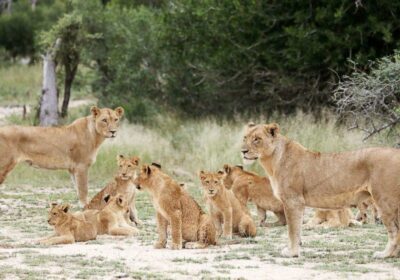South Africa to end captive lion breeding, bone trade

LONDON — South Africa announced Sunday it plans to end its multimillion-dollar captive lion industry and said it won’t oppose the international ban on the rhinoceros horn and elephant ivory trade.
The announcement was made alongside the release of a nearly 600-page report by a special government-appointed advisory committee tasked with reviewing the country’s policies, legislation and practices related to the management, breeding, hunting, trade and handling of elephants, lions, leopards and rhinos.
“The panel identified that the captive lion industry poses risks to the sustainability of wild lion conservation,” South African Minister of Forestry, Fisheries and the Environment Barbara Creecy said in a statement Sunday.
“The panel recommends that South Africa does not captive-breed lions, keep lions in captivity, or use captive lions or their derivatives commercially,” she said. “I have requested the department to action this accordingly and ensure that the necessary consultation in implementation is conducted.”
The committee also recommended that Creecy consult with other countries in the region to determine under what conditions current stockpiles of rhino horn and elephant ivory can be disposed.
Creecy said her department will move to adopt all recommendations in the report that were supported by the majority of the 25-strong High-Level Panel, which was established in October 2019. The committee came to a consensus on all recommendations except those for captive lion and rhino breeding, for which Creecy said she will take the majority view.
She stressed the recommendations were not against the hunting industry and that implementing them “will result in both protection and enhancement of South Africa’s international reputation, repositioning the country as an even more competitive destination of choice for ecotourism and responsible hunting.”
“Preventing the hunting of captive lions is in the interests of the authentic wild hunting industry and will boost the hunting economy and our international reputation and the jobs that this creates,” Creecy said.
South Africa has drawn criticism in recent years for commodifying its captive-bred lions at every stage of life, from birth to death. There are hundreds of facilities across South Africa that are legally breeding and raising thousands of lions as well as other big cats, sometimes in tiny enclosures and unsatisfactory conditions. Cubs are separated from their mothers just days after birth, so the adult females can be continuously bred.
The animals are then hand-reared so they grow up to be tame and used to humans. Cubs are used in petting attractions while they’re very young and small. Adolescent lions are used in other tourist activities, such as walking with lions.
When they get too big to safely interact with tourists, the lions are either recycled back into the breeding industry or sold to other facilities where they will be gunned down in canned trophy hunts or killed for their bones. The bones are typically shipped to East and Southeast Asia, where they are often used in jewelry or falsely advertised as tiger parts for luxury products.
Critics say it’s a poorly-regulated and cruel business that exploded into a multimillion-dollar industry amid the rising demand for lion parts, including teeth and claws, and at a time when the African lion, which is classified as “vulnerable” on the International Union for Conservation of Nature’s Red List of Threatened Species, is already in steep decline across the continent.
Conservationists say they have seen the detrimental impact that South Africa’s legal lion bone trade is having on the conservation of the region’s wild lion populations, because poachers have caught on to the growing market for lion parts. The South African government had previously raised concerns that bones would be sourced illegally from wild lions to satisfy demand if the trade in captive-bred ones was prohibited.
“Thousands of farmed lions are born into a life of misery in South Africa every year in cruel commercial breeding facilities,” Edith Kabesiime, Africa wildlife campaign manager for World Animal Protection, a global animal welfare nonprofit organization, said in a statement Sunday. “This latest move by the government of South Africa is courageous — taking the first steps in a commitment to long-lasting and meaningful change. This is a win for wildlife.”
Source: Read Full Article